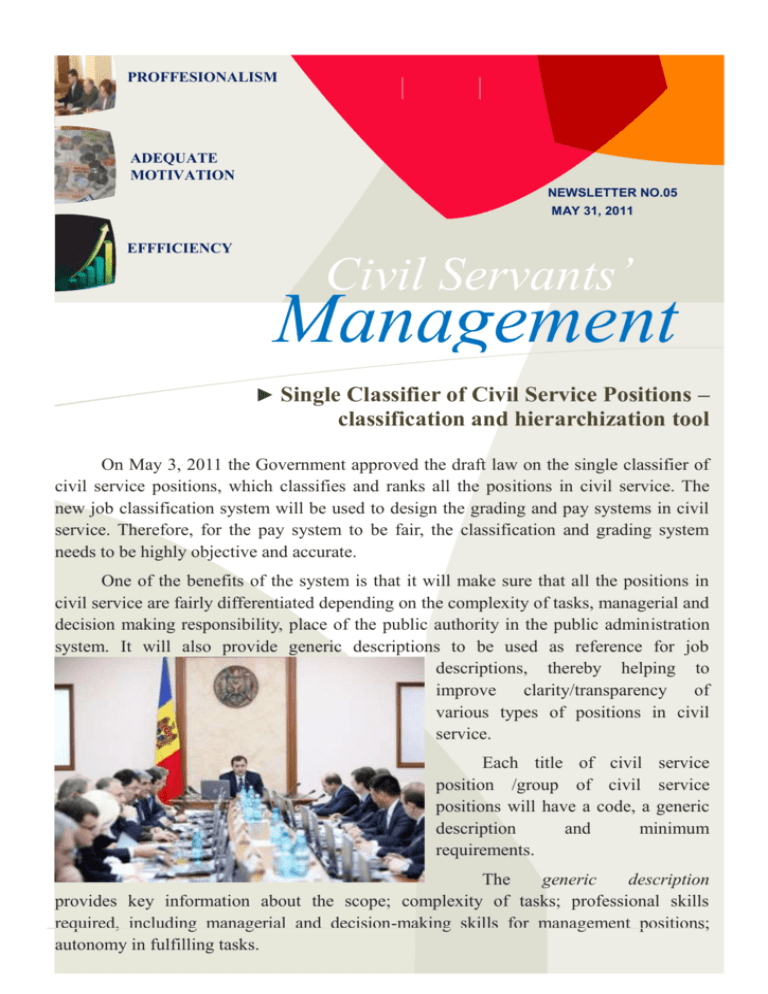Newsletter "Civil Servants` Management" nr.5
advertisement

PROFFESIONALISM ADEQUATE MOTIVATION NEWSLETTER NO.05 MAY 31, 2011 EFFFICIENCY Civil Servants’ Management ► Single Classifier of Civil Service Positions – classification and hierarchization tool On May 3, 2011 the Government approved the draft law on the single classifier of civil service positions, which classifies and ranks all the positions in civil service. The new job classification system will be used to design the grading and pay systems in civil service. Therefore, for the pay system to be fair, the classification and grading system needs to be highly objective and accurate. One of the benefits of the system is that it will make sure that all the positions in civil service are fairly differentiated depending on the complexity of tasks, managerial and decision making responsibility, place of the public authority in the public administration system. It will also provide generic descriptions to be used as reference for job descriptions, thereby helping to improve clarity/transparency of various types of positions in civil service. Each title of civil service position /group of civil service positions will have a code, a generic description and minimum requirements. The generic description provides key information about the scope; complexity of tasks; professional skills required, including managerial and decision-making skills for management positions; autonomy in fulfilling tasks. The minimum requirements to incumbents relate to the minimum number of years of relevant experience, certification in the sphere of activity (if appropriate), proficiency in an internationally spoken language (English, French, German) (if appropriate), computer skills. These are general requirements used to recruit, promote or transfer candidates. The public authority, in turn, may formulate its specific requirements, given the peculiarity and nature of tasks. The mandatory use of names of civil service positions from the Classifier by the public authorities will make it easier to match a position when a civil servant is transferred from one authority to another; plan efficiently the budget required for the remuneration of civil servants both at authority level and nation-wide; design and put in place a new pay system in civil service. The approval of the aforementioned draft is part of the public administration reform and enforcement of Law no.158-XVI of July 4, 2008 on the public office and status of civil servant, as well as of the Governance Program „European Integration: Freedom, Democracy, Welfare”. The draft is currently under the Parliament’s review. ► Training of Trainers – the most efficient way to share knowledge In the everyday life, with so many requirements and permanent changes and innovations, it is not enough to have a good job - we need to improve, we need ongoing training. Here the trainers play a special part; trainers are not just teachers. The concept of trainer is broader and more complex. Who are the trainers? There is no specific answer to this question, because any professional can become a trainer. The person just must want to become a trainer and have relevant skills like communication, presentation, planning skills and many, many others. The Training of Trainers (ToT) has been conceived to address the gap of required skills. The ToT is popular in many areas, because any specialist needs training and, as such, trainers. They are meant to train the trainers in various learning methods, planning of training, adult learning etc. To facilitate the ongoing training of civil servants, the Personnel Policy Division within the State Chancellery developed a Training of Trainers held in the period of May 24-27, 2011 within the Academy of Public Administration attached to the President of the Republic of Moldova. For efficiency purposes, the public authorities were asked to appoint each 2-3 persons for this training - future trainers in their authorities; the Personnel Policy Division, in turn, selected 20 applications that complied best with the criteria made public beforehand. The training has three modules (the first one has been already successfully completed, and the following two are expected to be held in the second half-year) lasting 3-4 days each. The trainees had the chance to learn the peculiarities of training public administration staff, the training forms and participatory methods; develop the skills for planning, organizing, performing and evaluating training activities in the area they work with. „This training is necessary, because my colleagues and I are sometimes engaged in internal training where we need to display the skills that we have acquired during this training. The training methodology issue was useful to us, as we have learned how to make a seminar interesting for the trainees. Although I criticize more often than praise, this training deserves praise!” – Liliana Buliga, senior consultant, HR unit, Ministry of Labour, Social Protection and Family. „This is the first training of this kind I am attending and it is worth the effort. I have experience in teaching (I was a university lecturer in the past) and here I had the chance to improve my knowledge, mainly in terms of adult learning and learning styles.” – Nadejda Beciu, main specialist, Division for Investment Policies and Export Promotion, Ministry of Economy. During the training the trainees will acquire skills to deliver both internal training within the public authority and external one, outside the public authority. ► New guidance for public authorities is underway The Personnel Policy Division within the State Chancellery is working on a new guidebook entitled „Professional development of staff in a public authority: internal training”. The guidebook will make an overview of the regulatory framework on the professional development of civil servants; provide the concept of internal training as part of the professional development of staff; objectives and funding of the training process; training suppliers; training stages; certain issues related to the procurement of training services; responsibilities of stakeholders in the internal training; methods to deliver internal training etc. The idea of a guidebook came from the HR practitioners from central and local public administration authorities who asked for informational and methodological support to facilitate the planning and delivery of training. The guidebook is meant for the managers of the central and local public administration authorities, managers and staff of various internal units, in general, and HR units in particular. It can also be used by management and execution civil servants who deliver internal training and providers of training services, and other stakeholders. The guidebook on professional development of staff in a public authority is expected to see the light of day in June 2011 and to be issued in 2500 copies and will be shared with central and local public authorities. Methodological assistance to public authorities For HR units Incompatibilities with civil service positions1 In relation to this, several issues, critical to the uniform and accurate enforcement of legal provisions need to be made clear. The incompatibilities with civil service positions is regulated by art.25 of Law no.158 - XVI of July 4, 2008 on the public office and status of civil servant (hereinafter Law no.158-XVI). 1. Pursuant to paragraph (1) of art.25 of Law no.158-XVI, a civil servant cannot hold two civil service positions at the same time. However there is an exception to this rule, provided for in paragraph (3), which says that a civil servant can fulfil, along with his/her duties and tasks, those of a temporary vacant civil service position in his/her public authority. The stress here is on the word „temporary” and „within the same public authority”. Last, but not least, the person empowered to appoint must issue an administrative act to allow a civil servant to hold two jobs. Otherwise, the case will be similar to the temporary substitution of a civil servant who is on vacation. The exception relates to a temporarily vacant execution position only. As for the management and top management positions the notion „interim performance” shall apply, as stated in art.49 of the aforementioned piece of legislation. 2. In accordance with paragraph (2) art.25 of Law no.158-XVI a civil servant may not carry out other paid activities: a) within public authorities, with several exceptions defined in legislation. 1 This material does not relate to the conflicts of interest of civil servants and the restrictions in the hierarchy of positions. These two issues will be addressed in a separate material. This means that regardless of the type of the paid activity, the civil servant may not perform such activity in a public authority. Since there are no special regulations to define the legal relations associated with the term „within public authorities” as stated in item a) paragraph (2), art.25 of Law no.158-XVI, the provisions regulating similar relations (analogy) shall apply, i.e. item c) of the same article and paragraph. Therefore, a civil servant may not carry out other paid activities deriving from an employment contract or any other civil contract signed with any public authority. A public authority is any entity that relates to the definition given for public authorities in art.2 of Law no.158-XVI. As for the exceptions referred to at item a), they relate to the cases when the law states expressly the possibility for a civil servant to work in public authorities. For instance there is special Sergiu Litvinenco, legal consultant in civil legislation that allows a civil servant to service issues serve as a councillor in a local/rayonal council (Law no.436-XVI dated December 28, 2006 on the local public administration; Law no.768-XIV dated February 2000 on the status of local councillors). b) while in a political position or while holding a position within the office of a political appointee, except for the cases when his/her service is suspended for the respective period under the law. Things are quite clear here: a civil servant may not be a political appointee or may not hold a position in the cabinet of a political appointee, unless his/her service is suspended for the term of office in the political position or position in the cabined of the political appointee. However, it should be noted that suspension of the service of a civil servant appointed or elected to the political position or position in the cabinet of a political appointee is not the only way to clear up the incompatibility. The concerned civil servant may submit a notice of resignation, which comes into effect after 14 calendar days from submission or within the period specified in the notice, if it is the case of being elected as politician. c) on employment contract or any other civil contract, within private companies, cooperatives, state-owned or municipal enterprises, as well as non-profit organizations, from the public or private sector, which are under control, accountable to or in some respect related to the scope of the authority he/she works for, except for the scientific, teaching, creative activities, as well as those involving representing the state in enterprises. A look at the aforementioned provision using the per a contrario argument of the logical interpretation method leads us to several conclusions: (i) A civil servant may carry out any paid activity based on employment contracts or any other civil contract in private companies, cooperatives, state-owned and municipal enterprises, as well as non-profit organizations, from the public or private sector, except for the entities which are under the control of, accountable to or in some respect relates to the scope of the public authority of the civil servant. Therefore this provision has nothing to do with the control, accountability lines or competence of the civil servant in relation to the entity where the civil servant takes the second job, but to the control, accountability lines or competence of the public authority in relation to that entity. In fact, it is not the position of a civil servant that matters, or whether it has anything to do with the entity where the civil servant is taking or will take the second job. It is the control, accountability lines between the public authority and the concerned entity that matter, and if, in some respect, the entity has anything to do with the scope of the public authority. It should also be noted that the meaning of the phrase „under the control of, accountable to or in some respect relates to the scope of the public authority of the civil servant” is not defined in any regulation, which means that the person empowered to appoint must, as prescribed by legislation, refer it to cases of incompatibility. (ii) Even if the private companies, cooperatives, state-owned or municipal enterprises, as well as the non-profit organizations, from the public or the private sectors, where the civil servant takes or will take the second job are under control, the civil servant may carry out scientific, training, creative activities and represent the state in enterprises. All the issues related to part-time jobs of civil servants, with particular reference to teaching, scientific work, art and representation of the state in enterprises are detailed in the Rules on part-time jobs for civil servants, approved through the Government Decision no.201 of March 11, 2009 as amended (annex no.4). According to these rules, a civil servant may take additional jobs in his/her hours and days off. The only activities that may be carried out during the working hours are teaching (no more than 6 hours per week) only with the agreement in writing of the head of the public authority, and representation of the state in enterprises, as described in the Regulation on the representation of the state in enterprises, approved through the Government Decision no.1053 dated November 11, 2010. Any other activities allowed to the civil servant will be carried out in his/her hours and days off. Teaching may be also practiced in the civil servants’ days and hours off, and in this case it has no restrictions in terms of the time. 3. Apart from the incompatibilities mentioned above, according to art.25 paragraph (4) of Law no.158-XVI, a civil servant may not act as a representative of a third party in his/her public authority, including in respect to actions related to the position he/she holds. A “representative” here means the person entrusted to do something. The term will not confine to the meaning used in the entrustment agreement as defined in art.1030-1052 of the Civil Code of the Republic of Moldova. 4. In case any of such incompatibilities are detected, the provisions of art.25 paragraph (6); article 57, item j) and art.64 item c) of Law no. 158-XVI shall apply. Therefore, according to art.25 paragraph (6) of the aforementioned piece of legislation, a civil servant engaged in activities incompatible with the position held receives a notice in writing by the head of the public authority, requiring him/her to quit the incompatible activity. If after one month from the receipt of the notice the civil servant does not comply with the requirement, he/she is dismissed. On one hand, this deadline is given for the administrative removal of incompatibilities, and on the other hand - as a specific sanction for the civil servant’s unresponsiveness. Therefore, once any incompatibility is detected, the manger must give a written notice to the civil servant to quit the activity incompatible with the civil service position. If after one month from the receipt of the notice the civil servant does not comply with it, the head of the authority must issue an administrative act for the dismissal of the civil servant pursuant to art.64 item c) of Law no.158-XVI. In other words, the dismissal under art.64 item c) shall apply to any civil servant who takes no action to clear up the existing incompatibility. In fact, the period of one month provided in legislation is given in the civil servant’s interest. Apart from that, art.57 item j) of Law no.158-XVI says that noncompliance with the provisions related to the obligations, incompatibilities, conflict of interest and restrictions, is regarded as misconduct. Therefore, even if a civil servant clears up the incompatibility within the timeframe given in the notice of the head of the authority, he/she can be imposed, if such be the case, disciplinary sanctions, because he/she did not comply with the imperative legal provisions related to the incompatibilities, as defined in paragraphs (1) to (4) of article 25 of Law no.158-XVI. It should be noted that depending on the circumstances, seriousness and period of the incompatibility, the disciplinary commission might advice the head of the authority, after a prior investigation and other procedural measures stated in the law, the dismissal as a disciplinary sanction. Here art.64, item a) or b) shall apply, instead of art.64 item c) of the Law no.158-XVI. Personnel Policy Division within the State Chancellery Tel.: (0 22) 250 137; e-mail: dpc@gov.md www.rapc.gov.md








